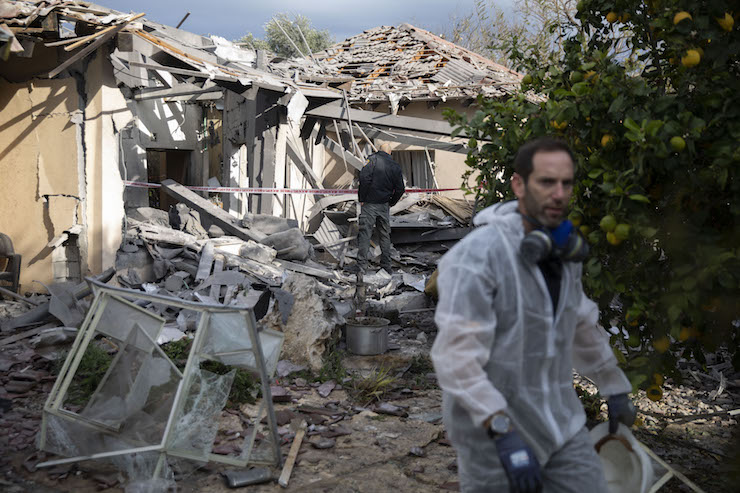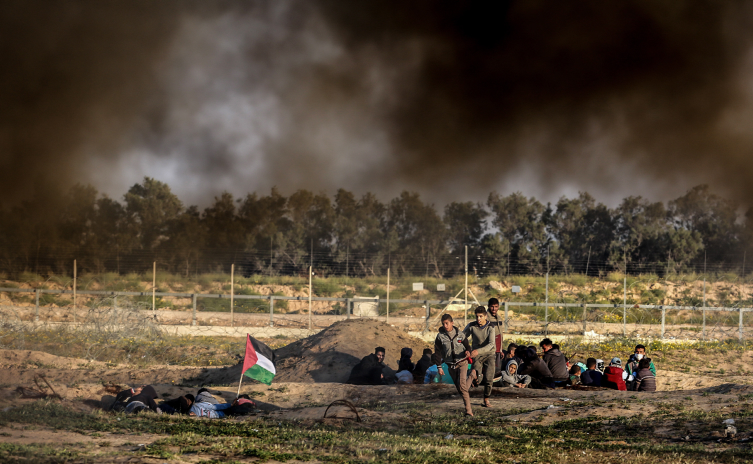We need leaders who can talk about ending the siege, about ending the occupation, about equality, freedom, and security as the only solution for both Israelis and Palestinians.
By Haggai Matar and Oren Ziv

The rocket fired from Gaza that destroyed a home and wounded seven people in central Israel Monday morning, took Israelis by surprise. On the one hand, that’s totally understandable; we aren’t used to rocket fire in the Tel Aviv area, and certainly not rockets that exact such a devastating price. An attack on civilians, on a sleeping family, is a terrifying thing.
On the other hand, the attack is surprising only if we disconnect it from all the stories that don’t get any airtime: unarmed protesters shot on the Israel-Gaza fence almost every week (only recently, a 14-year-old was shot dead by Israeli snipers), several deadly incidents West Bank in recent weeks, along with attacks and other steps being taken against Palestinian prisoners held in Israeli jails. When we talk about Palestinian aggression, hardly anyone mentions the fact that since the beginning of the year, Israeli security forces have killed 30 Palestinians in Gaza and the West Bank.
The rocket attack is a surprise only if we allow ourselves to forget the wider context of the daily reality of occupation — from arrests of Palestinian children in their classrooms to settler attacks on Palestinian farmers — or the siege on Gaza, which has left the Gazans impoverished and hopeless.
None of this justifies attacks on Israeli civilians, of course, but it should remind us that Israel is the one attacking Palestinian civilians on a daily basis. We cannot lose sight of that context when we talk about what may come next.
In response to the rocket attack Monday morning, Prime Minister Netanyahu said Israel would “respond with force.” (At the time of publication, those attacks had begun.) Deputy Defense Minister Eli Ben Dahan, who visited the destroyed house in the moshav of Mishmarot, described the Israeli government’s three options: continue shooting on “empty depots” in Gaza, re-occupy the strip, or re-institute Israeli’s targeted killing program.
Education Minister Naftali Bennett said that Hamas must be “subdued,” while Netanyahu rival Benny Gantz, whose campaign ads bragged of sending Gaza back to the Stone Age, blamed Netanyahu for the rocket attack for not striking Hamas and Gaza harder. Far-right politicians demanded Gaza be “flattened.”

Some residents of Mishmarot, however, took a different tone. Yoni Wolf, whose family lives in the house that was destroyed by the rocket, told reporters Monday morning that Israel must “regain not only its deterrence but also its sanity.” Another resident of the town said one of his former employees, a Palestinian man from Gaza, called to ask how he was doing. “Not everybody hates us,” he said.
The danger is that now, following the attack on Mishmarot, in light of the upcoming elections, and in an attempt to maintain his image as “Mr. Security,” Netanyahu could be dragged into the deadliest and most devastating round of violence we have seen since the last Gaza war in 2014.
But there is another way. We can stop the bloodshed. We do not have to wage another pre-election war. We can stop speaking in empty slogans about destroying the Hamas regime. These are lies, they have always been lies. What we need is leader who can talk about negotiations, ending the siege and the occupation, about equality, freedom, and security as the only solution for both Israelis and Palestinians.
This article was first published in Hebrew on Local Call. Read it here.

